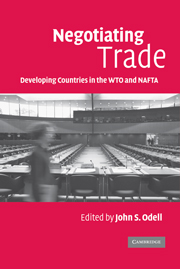Book contents
6 - Getting to “No:” defending against demands in NAFTA energy negotiations
Published online by Cambridge University Press: 22 September 2009
Summary
On August 12, 1992 Mexico, the United States and Canada finally completed the negotiations for the North American Free Trade Agreement (NAFTA), which had started more than a year earlier. They were unprecedented trade negotiations in that they posed Mexico, a developing country, against the world's sole remaining superpower in an attempt to establish a deep integration agreement. There was little precedent to fall back on, and it was largely expected that the United States would virtually dictate the agreement, given the huge power asymmetries between the negotiating parties.
During NAFTA negotiations, Mexico was loath, because of the nationalization of the oil industry in 1938 and the weighty symbolic importance oil still had (and has) in Mexican politics, to permit US participation in Mexico's oil industry. For its part, the US government was very interested in gaining access to Mexican oil reserves in terms of foreign investment access and supply guarantees. It was a complicated negotiating situation for Mexico, to say the least. As Jagdish Bhagwati stated, “If I were a consultant for Argentina or Brazil, I would tell them not to join NAFTA, because that is where the United States plays the game as they want to … just look at Mexico. They are sweating tears … because now the United States have started to negotiate free trade agreements with other countries. The advantages they [Mexico] had have disappeared and the concessions they made to achieve the agreement will stay in place.
- Type
- Chapter
- Information
- Negotiating TradeDeveloping Countries in the WTO and NAFTA, pp. 177 - 216Publisher: Cambridge University PressPrint publication year: 2006
- 3
- Cited by

